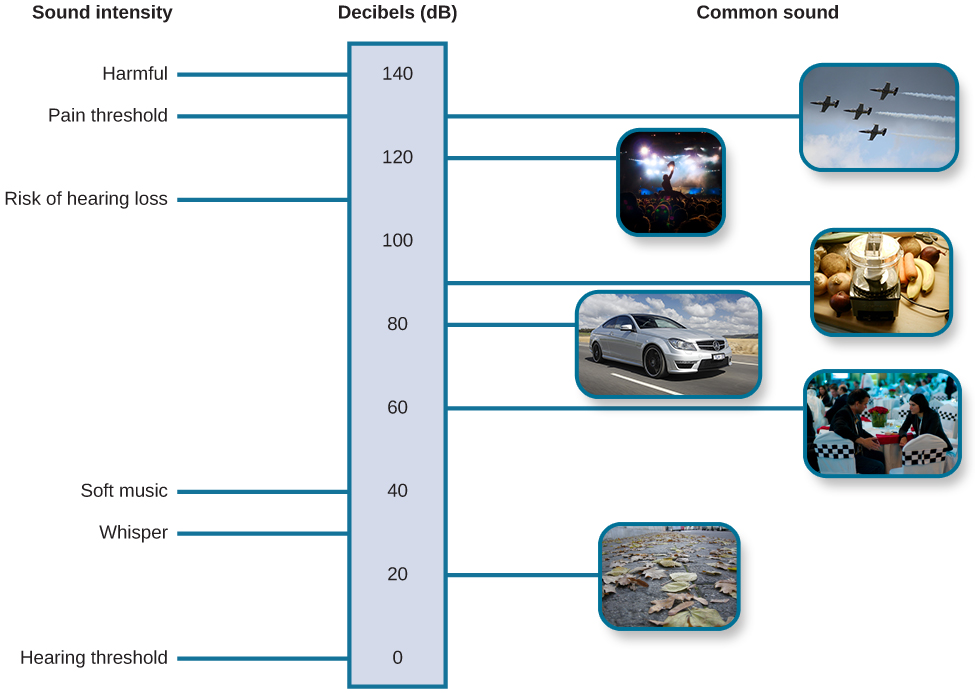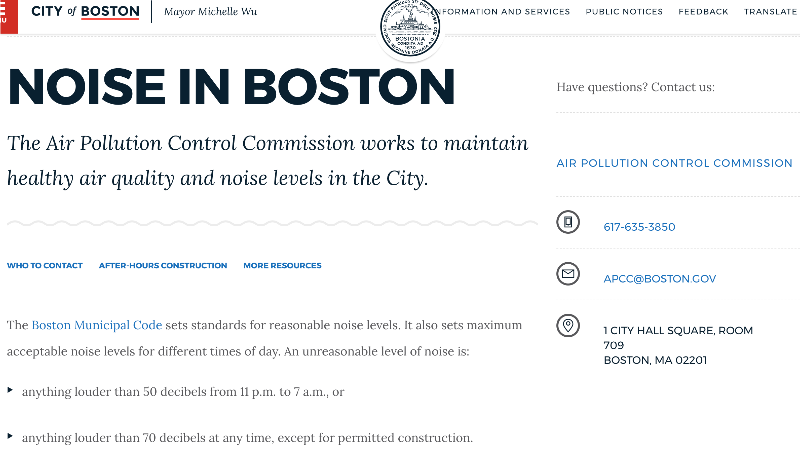How to Deal with Noisy Tenants and Noise Complaints in Rentals
. Posted in News - 4 Comments
By Eric Weld, MassLandlords, Inc.
Noise complaints are among the most common issues landlords deal with. Yet, how to deal with unreasonable noise and noise complaints in rentals can be one of the trickiest, case-by-case problems landlords and property managers encounter.

Crying babies, kids playing instruments and other everyday domestic noises are part of residential living, though sometimes they can be the sources of noise complaints. Dealing with noise complaints often requires deft communication. Image: cc by-sa Wikimedia Commons
Noise complaints, in general, are on the rise. As populations grow, housing becomes denser and more people live closer together, it stands to reason that noise will increase, along with complaints about it, especially in urban areas. In both Boston and New York City, calls to 311 – a city hotline for general complaints – to report noise disturbances have shot up in recent years. (Many of these are for traffic noise and public noise generated by loud music at venues, for example, not always complaints against fellow tenants.)
There are laws, local ordinances and rental agreement provisions written to define noise and build parameters around how much and what kind of noise is permissible at which hours. Like the MassLandlords standard rental agreement, most leases include rules prohibiting tenants from making unreasonable noise, disturbances or other activity that interferes with other tenants’ peaceful enjoyment of their homes.
(You may be familiar with the term “quiet enjoyment.” This has absolutely nothing to do with noise. This is a legal term of art from General Law Chapter 186, Section 14, which prohibits landlords from interfering with normal domestic activities, such as cooking, cleaning, watching TV, listening to music, talking, etc.)
State landlord-tenant law is actually silent about noise. So, what constitutes “noise” or “unreasonable noise” is subjective and, unless your town says otherwise, up for individual interpretation.
For one person, strumming the guitar at midnight after a late work shift provides needed catharsis. But for their downstairs neighbor with a bedroom directly underneath, it’s a grating disruption keeping them awake. One tenant likes to rise at 8 a.m. and mow the lawn on weekends, perfectly within town ordinances. For their fellow tenants who prefer to sleep in on weekends, it’s a nuisance.
Are there guidelines and tools that landlords can apply in dealing with noise complaints from tenants about other tenants? Can landlords mitigate excessive and unnecessary noise through preemptive lease provisions? Is there a template for landlords to follow when noise complaints come in? How best to keep noisy tenants from disrupting others’ peaceful enjoyment of their domicile?

This graphic, by Lumen Learning, indicates noise levels (in decibels, dB) of some everyday occurrences. Image: cc by-sa 4.0 Lumen Learning, Wikimedia Commons.
The Noise of Life
Chances are if you live in a multi-family rental, you will hear your neighbors making noise sometimes. Noise is part of life, and the source of many tenant noise complaints are common, everyday activities. Other renters talking or arguing, listening to loud music or TV, walking on hard floors and clanging pots and pans. Kids yelling or crying, running and bumping walls or playing instruments. Pet dogs barking.
Many renters’ noise complaints can be handled with some deft communication and a little creativity and negotiation between the noisemakers and complainants, with mediation by a landlord or property manager.
James Thomson, an owner and manager of rental properties in Hampshire County, recently received a noise complaint from a tenant about a nearby couple arguing loudly.
“When the complainant called me, he was very distressed,” said Thomson, “so I just listened, tried to sympathize and asked what he suggest I do.” The tenant suggested a brief message to the arguing couple. “I waited a couple of days and sent a brief note to the neighboring tenants, saying only that I had received a ‘report’ about a loud domestic disturbance…and asked them to please consider that sound travels easily and to try to find other ways to resolve family disagreements.” So far, Thomson has not heard back from the couple, but has not received any further noise complaints.
Stephen Bosco, who owns and manages rentals in Holyoke and has dealt with numerous noise complaints over the years, advises considering the full context around the complaint. “My first rule of thumb with these types of complaints is that the complainant is usually exaggerating,” he explained. “There have been a few cases early in my career where I made a concerted effort to verify the noise,” – including, he admitted, once sleeping on a tenant’s couch – “and discovered that it was a lot less severe than it had been described as.”
It’s when noise becomes unusually excessive, ongoing and/or happens during normal sleeping hours that it can boil into a problem that landlords have to deal with more deftly. Like tenants having loud, late-night parties, or screaming at one another every night in the wee hours for all to hear.

Boston, like most municipalities, attempts to mitigate excessive noise by defining acceptable noise levels within certain hours of the day. This Boston.gov memo, which states that noise louder than 50 dB is prohibited between 11 p.m. and 7 a.m., is unrealistic as a standalone parameter. The memo refers to further explanation in Air Pollution Control Commission regulations. Image: Boston.gov
Local Laws
Laws and ordinances governing noise making vary slightly from municipality to municipality. Most noise laws prohibit excessive noise between certain hours, from late night to early morning. But much as these laws attempt to define noise – and some of them do try – their often-complicated language (and legalese) still leaves ample room for interpreting when unreasonable noise is being made.
To wit, the state Department of Environmental Protection employs a noise law as part of its air quality control policy, mostly pertaining to the operation of heavy equipment. “A source of sound will be considered to be violating the department’s noise regulation (310 CMR 7.10) if the source produces a ‘pure tone’ condition – when any octave band center frequency sound pressure level exceeds the two adjacent center frequency sound pressure levels by 3 decibels or more.”
Is that clear?
The City of Boston includes noise ordinances as part of its air pollution control regulations. According to a City of Boston 2021 memo, the city bans noise louder than 50 decibels between the hours of 11 p.m. and 7 a.m. and noise louder than 70 decibels at any time, except during permitted construction. (The memo refers to Air Pollution Control Commission regulations that more specifically define this parameter, with definitions of noise standards, sound pressure levels and distinctions for different zoning districts. As a standalone restriction, 50 decibels is a very low allowable noise level. It would prohibit running a hair dryer (90 dB), for example, or even normal conversation late at night (60 dB)).
Plymouth, rather than measuring noise in decibels, attempts to specify types of noises disallowed. “It shall be unlawful for any person or persons occupying or having charge of any building, structure, vehicle or premises or any part thereof in the town to cause or suffer or allow any unnecessary, loud, excessive or unusual noises in the operation of any radio, phonograph or other mechanical sound-making device or instrument, or reproducing device or instrument, or in the playing of any band, orchestra, musician or group of musicians, or in the use of any device to amplify the aforesaid, or the making of loud outcries, exclamations or other loud or boisterous noise or loud and boisterous singing by any person or group of persons, or in the use of any device to amplify the aforesaid noise, where the noise is plainly audible at a distance of 150 feet from the building, structure, vehicle or premises in which or from which it is produced.”
Worcester illegalizes “persistent or repeated yelling, shouting, hooting, whistling, singing, or the making of other loud noises between the hours of 9 p.m. and 7 a.m.” that is audible from 25 feet or more in any direction, or “so as to annoy or disturb the reasonable quiet, comfort or repose of persons” in the vicinity.
You get the idea.
Depending on respective towns’ noise ordinances, such laws may assist landlords in addressing noise complaints among tenants. In particular, if one tenant is making excessive noise consistently in the middle of the night, despite multiple complaints and requests to stop, a local ordinance may support a notice to quit based on a breach of the law as well as the rental agreement.
More likely, however, given the difficulty of defining illegal noise, dealing with most noise complaints will take more creativity than relying on the law.
What to do With Noise Complaints
Noise complaints take many forms. They can be formal or informal, submitted via email, phone, a written note or in person. They could come at any time of day, including urgently in the middle of the night when allegedly excessive noise is occurring.
However noise complaints are levied, landlords and property managers are advised to take them seriously and act on them as quickly as possible. Your tenant did the right thing by bringing the complaint to you rather than confronting their noise-making neighbor directly. If left unattended, a simple noise complaint could escalate into a more serious tenant dispute.
Once you’ve received a noise complaint, you need details. First, talk with the complainant to gather specifics: What kind of noise is it? When did it or is it occurring? Once or ongoing? How often? How is it disrupting your quiet enjoyment? Is there any evidence of the noise, like a recording?
In many cases, during the course of obtaining details, it might become apparent that the noise and the complaint are mild and simply remedied. Maybe for upstairs neighbors with loud, hardwood floors, vinyl plank flooring with cork underlayment could fix the issue. Perhaps a late-night guitarist could simply move to another room not above bedrooms.
On occasion, some noise complaints may have to be weighed carefully. If a tenant complains repeatedly every time a neighbor’s baby cries, or files a complaint that a fellow tenant drives a loud car home late at night, it may require finesse in explaining that these are not actionable noises (assuming the car is muffled at a legal level). While some noise-sensitive people might argue that such noises impinge on the quiet enjoyment of their home, these noises are likely of normal, acceptable level. If a person lives in a multi-family environment, they have to accept that fellow tenants will, and are allowed to, make some noise.
In such cases, you may need to gently explain to your noise-sensitive tenant that these noises are part of everyday life in a multi-family complex. You might even suggest a sleep-enhancing device like the Hibermate, an affordable sleep mask with comfortable earmuffs that cancel noise. And if they absolutely can’t tolerate normal noise occurring around their home, they could consider relocating.
In Thomson’s case cited above, he also offered his distressed complainant an option to end his lease if he chose to. “I told him that I only want happy tenants and that if he needs to leave for any reason, I will gladly end his lease early. I think this was comforting rather than threatening, given the circumstances, though that might not be the right approach for every tenant.”
For noise complaints that do require action, once you’ve received details from the complainant, a talk with the person charged with making noise is necessary. Without the complainant present, point out the charge as evenly as possible. Find out the accused’s perspective. It’s possible they weren’t aware that they were causing disruptive noise and they may volunteer a solution or cease the noise on their own once they are made aware it’s causing disturbance.
Judgement Call: Excessive Noise or Not?
When an excessive noise-making tenant does not agree with the complaint or just refuses to comply with a request to cooperate, the situation can become more complicated.
Still, it’s important to remain objective and to continue gathering information. If there is no evidence of the noise available, you should discuss the matter with other tenants, without letting them know that there is a dispute. Maybe others have similar complaints with the charged tenant. Either way, more information will help determine how to move forward.
At some point, you may have to make a judgment as to whether a tenant’s noise making is excessive. If it’s determined that it is noise making that requires action, you have two subsequent options: 1) Try to work with the noise maker to stop or lessen the disruption. Turn down the TV, turn off the music at 10 p.m., stop hosting outdoor parties every Saturday night, or shift kids’ instrument practice schedules, for example. And 2), If such remediation doesn’t work, or if you have a defiant tenant unwilling to change their noise-making behavior even after being warned, you may have no choice but to issue a notice to quit.
Before issuing such a notice, be certain you have informed the noise perpetrator about what will happen if they do not stop making their disruptive noise; i.e., you will give them a notice to quit, based on a violation of the lease and unlawful behavior. A notice to quit can always be rescinded, giving the tenant a final chance to correct their noise making at the threat of eviction if they fail to comply. Otherwise, your ending the tenancy will send a clear signal that enough is enough.
“I’ve had people who regularly cranked up the music until your teeth would rattle,” described Bosco. “I’ve served notices to quit against such people, and even made summary process filings. I can’t remember an example of anyone continuing with it after that. I haven’t had to actually litigate it.”
Moving to eviction is a final resort, and it’s rare that a noise complaint goes that far. But if it does, make very sure the noise in question is a clear violation of the lease, and if possible, of local ordinance. Ideally, if you move to a court proceeding, you will have some kind of evidence of the noise that makes it clear it is not legal or allowed in the lease. (Remember: Massachusetts requires consent by both parties to record phone calls and conversations. If you try to record noise making clandestinely, make sure it doesn’t contain voices without consent to record.)
Finally, an eviction case based on making noise may be a tough one to win in court. For a persistent noise maker that you want to vacate, instead of filing for eviction, you might consider alternatives such as cash for keys.
Best Practice: Head Off Noise Issues in the Lease
Noise complaints, like other landlord issues, are best handled preemptively by defining as clearly as possible what is not allowed in the rental agreement. The MassLandlords lease includes a provision in which the tenant agrees to: “Ensure that there is no unreasonable noise or disturbances, loud parties, any illegal drugs or other illegal activity on the premises, or any other activity that interferes with the quiet enjoyment of the premises by other residents or neighbors, interferes with the management of the property, or threaten the Landlord or manager.”
The MassLandlords lease also includes a stipulation to “treat neighbors and their visitors respectfully and resolve conflicts courteously.” This clause, while subjective, at least serves as a reminder for tenants to be aware that they are living near other people and need to be considerate of them.
Some rental agreements might take a cue from town noise ordinances and list certain hours and decibel levels that define how much noise is allowed at certain times of day within a multifamily property.
Specificity in the lease not only establishes rules around noisy behavior before and during the tenancy. It also will greatly assist in the event disputes around noise making escalate to the point of forcefully removing a tenant from their rental unit.
Noise is Bad for Your Health
Excessive noise is more than just a nuisance. Multiple studies show that loud noise, especially when it’s sustained, is detrimental to health in a variety of ways. Harsh noise is stressful, for one, and triggers the body’s release of adrenaline and the stress hormone cortisol. That, in turn, can lead to hypertension, increased blood pressure and heart rate, and cardiovascular disease.
A recent New York Times article outlines how harmful loud and persistent noise can be to people’s health, even shortening the lives of people subjected to years of it.
While studies focus on noises like shrill sirens, train horns and roaring jet engines, even everyday sounds like loudly barking dogs, leaf blowers and angry, yelling people can cause spikes of stress and health-averse reactions.
Like the Hibermate mentioned above, noise-cancelling headphones can be highly effective in mitigating loud noise from leaf blowers, air conditioners and other droning white noise. Noise-cancelling headphones can be expensive, starting at $60 and up; landlords might want to purchase a pair to have on hand to loan complaining tenants until their noise dispute is mediated, if only to smooth tension temporarily.
Given the potentially harmful effects of noise, it’s no surprise that many cities and states include excessive noise ordinances as part of their air quality sections through health departments. People have need for, and as much right to, noise-friendly surroundings as they do to clean air and water, and freedom from harsh lighting when it’s dark.
In that context, dealing with noise complaints in rentals is similar to handling complaints about, say, smoking or bright lights being left on at night. For landlords, it’s a matter of coordinating cooperation and cultivating consideration among people living in close proximity to one another.




